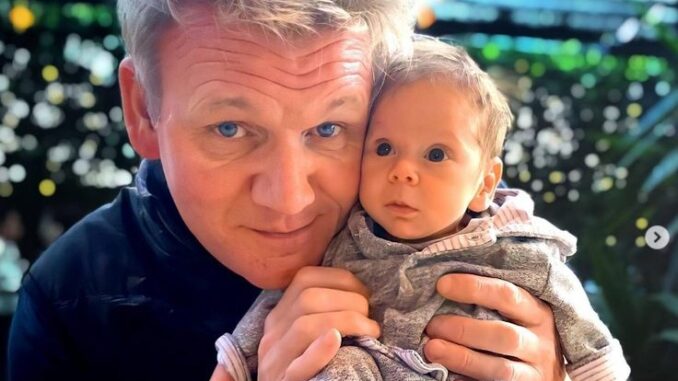
When people think of Gordon Ramsay today, they see the celebrity chef, the television giant, the man with over a dozen Michelin stars and global fame. They see him standing in the middle of a high-pressure kitchen, commanding attention with his iconic scowl and fiery energy. But what many don’t realize is that Gordon Ramsay’s journey to the top was anything but easy — it was built on heartbreak, hardship, and an almost obsessive pursuit of excellence. His success isn’t the result of overnight fame; it’s a story of survival, grit, and relentless discipline.
Gordon Ramsay was born in Johnstone, Scotland, in 1966, but he spent most of his childhood in Stratford-upon-Avon, England. He came from a working-class family where stability was rare. His father struggled with alcoholism and violence, which cast a long shadow over Ramsay’s early years. The family moved constantly, often running from unpaid rents or broken relationships. For Gordon, the chaos at home meant he had to grow up fast — emotionally and practically. At a young age, he was already learning how to take care of himself, cook simple meals, and mentally prepare for whatever instability might come next.
Initially, Ramsay didn’t plan on becoming a chef. In fact, his dream was to become a professional footballer. He had talent, too, earning a spot in the Glasgow Rangers youth squad. But just as that dream was beginning to take shape, a serious knee injury ended it. For someone whose escape from family trauma had been sport, the injury was devastating. Yet, instead of giving up, Ramsay pivoted. He went to culinary school and decided to take cooking seriously — and from that point on, his life changed.
What followed were years of backbreaking work. Ramsay trained under some of the most brutal chefs in the business, including the legendary Marco Pierre White in London and later the exacting Guy Savoy and Joël Robuchon in France. The kitchens were unforgiving. Mistakes weren’t tolerated. Sleep was a luxury. And respect had to be earned every single day. Ramsay didn’t just survive these environments — he thrived in them. He studied every dish, every technique, every pressure point in the kitchen, soaking up knowledge with military precision. He was ambitious, obsessed, and more determined than anyone else in the room.
But it wasn’t just about food for Ramsay. It was about proving to himself — and maybe to the world — that he could rise above the chaos of his past. That he wasn’t defined by where he came from, but by where he was going. In interviews, Ramsay has admitted that his tough exterior comes from those early battles, both in the kitchen and at home. He learned that in order to succeed, you have to outwork everyone else. You have to be relentless.
His first major breakthrough came in 1998, when he opened Restaurant Gordon Ramsay in Chelsea, London. Within three years, it had earned three Michelin stars — one of the most coveted accolades in the culinary world. At just 35 years old, Ramsay became one of only a handful of British chefs to achieve such a feat. But he didn’t stop there. Over the next two decades, he built a restaurant empire that spanned the globe, from London to Las Vegas to Dubai. Each location bore his signature standards: high-pressure service, obsessive attention to detail, and world-class food.

As Ramsay’s culinary fame grew, so did his television career. Shows like Hell’s Kitchen, MasterChef, Kitchen Nightmares, and The F Word turned him into a household name. Millions watched as he whipped failing restaurants into shape, screamed at incompetent chefs, and held contestants to impossibly high standards. To some, he came off as cruel. But those who watched closely saw something deeper: a man who demanded greatness because he knew how hard life could be if you settled for anything less.
What many don’t see behind the tough exterior is Ramsay’s deep empathy and loyalty. Beneath the shouting and the insults lies someone who remembers what it was like to have nothing — to sleep on floors, to feel like you didn’t belong, to grow up in fear. He’s tough because the world was tough on him first. He’s harsh because excellence doesn’t come easy. And he cares deeply about the people who try to rise with him. That’s why so many of his protégés and staff stay loyal for years — they know that behind the fire is a man who builds people up once they prove they’re ready.
His success hasn’t just been professional — it’s been personal too. Ramsay has spoken openly about how his career could have easily spiraled into obsession, how fame and pressure tested his marriage and family life. But he’s also made clear that family is his anchor. He credits his wife Tana with being his rock, and he lights up when talking about his six children. Despite his fame, he insists on keeping his family grounded. His kids fly economy while he flies business. They have to earn their own money. He teaches them the same lesson he learned the hard way: nothing worth having comes easy.
Today, Gordon Ramsay is one of the most influential figures in food and television. He has turned his name into a brand that represents not just culinary excellence, but resilience, ambition, and no-nonsense leadership. His empire includes restaurants, TV shows, cookbooks, digital content, and even charitable work through the Gordon and Tana Ramsay Foundation.
But behind all the success, the Michelin stars, and the fiery outbursts, is a story that began with a little boy from a broken home, sleeping on the floor, dreaming of a better life. Gordon Ramsay didn’t just chase that dream — he built it with his own hands, one dish, one risk, one sleepless night at a time.
